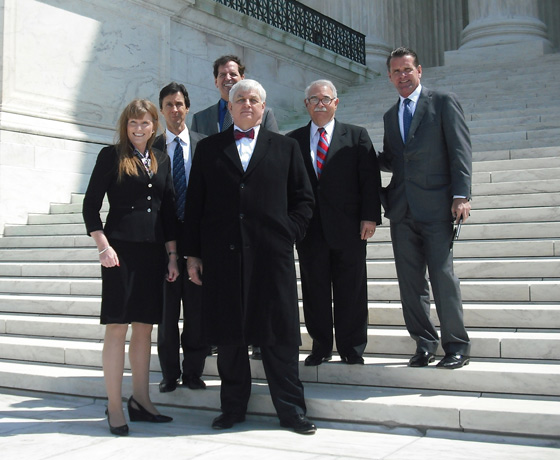
Last Thursday, the U.S. Supreme Court issued a unanimous, precedent-setting ruling that will affect taxpayers throughout the nation.
The court found that a taxpayer who wants to question Internal Revenue Service agents about their motives for issuing a summons may do so if he can point to “specific facts or circumstances plausibly raising an inference of bad faith.”
Edward A. Marod led the Gunster team in defense of respondent in U.S. vs. Clarke before the court. Gunster team members included: Jack Aiello, Martin Press, Lu-Ann Dominguez, Alan Lederman, plus co-counsel in D.C., Wilmer Hale.
What follows is Marod’s statement regarding the ruling:
* * * *
I believe I speak for everyone involved in our effort in saying that we are very pleased with the result.
This case was brought to the Supreme Court by the Solicitor General of the United States after we obtained a ruling in our client’s favor at the 11th Circuit Court of Appeal last year. The government sought a reversal of the 11th Circuit’s decision and a remand to the District Court for immediate enforcement of five IRS summonses that had been initially served in 2010, but were never enforced until after Tax Court litigation had begun.
While the Supreme Court did vacate the decision of the 11th Circuit, by a unanimous 9-0 vote it adopted as the new standard for all courts in the U.S. a standard that we articulated during oral argument and sent the case back to the 11th Circuit for further consideration.
For our case, we look forward to the further proceedings in the 11th Circuit because, as the Supreme Court acknowledged, we have already submitted facts supporting our right to a limited evidentiary hearing. On remand, the 11th Circuit will evaluate those facts under the new standard. We are confident that the facts we have submitted will meet that standard.
The Clarke decision makes clear that all U.S. taxpayers can obtain an evidentiary hearing to challenge the enforceability of IRS summonses based on a clear and uniform standard.
The path set by this decision is likely to allow more taxpayers, nationwide, to obtain an evidentiary hearing than had previously been the case.

Gunster attorneys made their case before the U.S. Supreme Court in April 2014. Pictured from left to right: Lu-Ann Dominguez, Jack Aiello, Alan Lederman, Ed Marod (foreground), Martin Press and Managing Shareholder Bill Perry.
For more information on the case:
- United States vs. Clarke (SCOTUSblog)
- Supreme Court rules taxpayer can challenge IRS summons (Reuters, 6/19/14)
- Supreme Court gives taxpayers standard to challenge IRS summonses (Bloomberg BNA, 6/20/14)
- Gunster tax law specialist to address recent SCOTUS decision on contesting IRS summons (Gunster.com, 6/20/14)
 |
Yes! Please sign me up to receive email alerts from other Gunster practice areas. |
| Image courtesy of FreeDigitalPhotos.net | |
|
This publication is for general information only. It is not legal advice, and legal counsel should be contacted before any action is taken that might be influenced by this publication. Gunster, Florida’s law firm for business, provides full-service legal counsel to leading organizations and individuals from its 11 offices statewide. Established in 1925, the firm has expanded, diversified and evolved, but always with a singular focus: Florida and its clients’ stake in it. A magnet for business-savvy attorneys who embrace collaboration for the greatest advantage of clients, Gunster’s growth has not been at the expense of personalized service but because of it. The firm serves clients from its offices in Fort Lauderdale, Jacksonville, Miami, Orlando, Palm Beach, Stuart, Tallahassee, Tampa, The Florida Keys, Vero Beach and its headquarters in West Palm Beach. With more than 160 attorneys and 200 committed support staff, Gunster is ranked among the National Law Journal’s list of the 350 largest law firms. More information about its practice areas, offices and insider’s view newsletters is available at www.gunster.com. |
